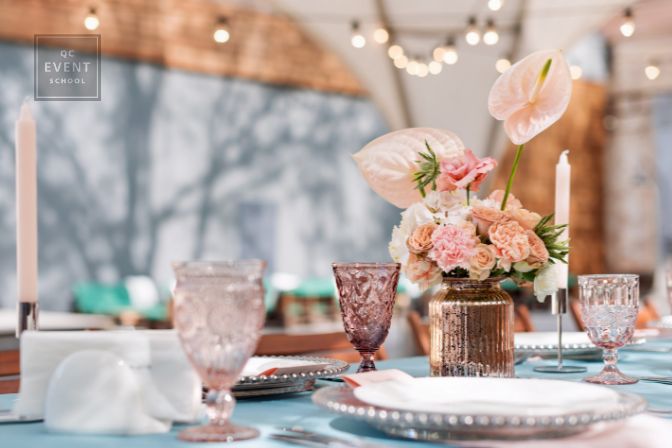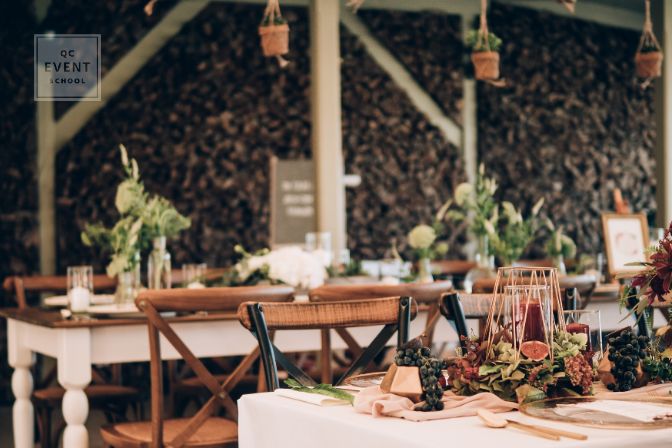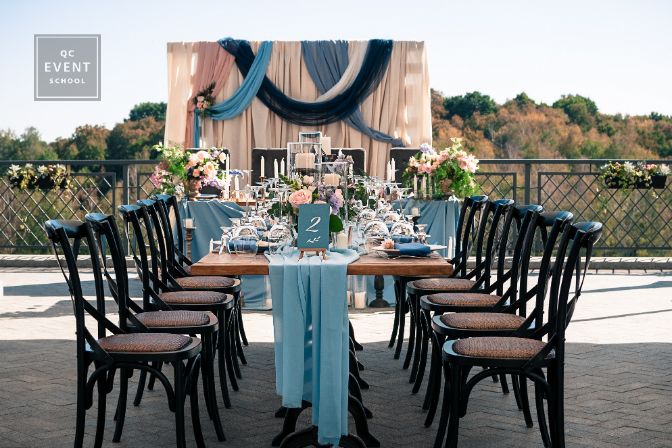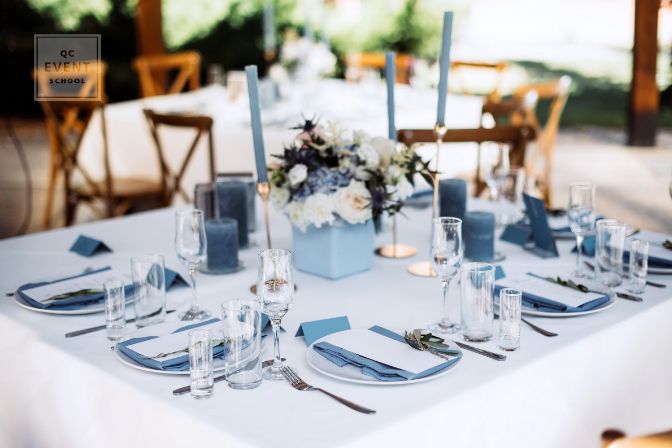
Business, General Tips, Your Event Career
The 10 Must-Have Skills EVERY Event Planner Needs
If you’re thinking of becoming an event planner, or you are a current event planner looking to improve your skills, then you’ve come to the right place. In this article, we will break down and discuss the 10 must-have skills every event planner needs in order to succeed in the industry.
So, whether you’re just starting out or you’re looking for ways to take your business to the next level, read on for essential skills that will help you become a successful event planner!
PRO TIP: Think event planning is the PERFECT career path for you? Then check out our Ultimate Guide to Becoming an Event Planner (yes, even without prior experience) to learn everything you need to get started!
What Is Event Planning?
Event planning is the process of organizing a:
- Festival
- Conference
- Ceremony
- Wedding
- Funeral
- Party
- Or other special event
What Does an Event Planner Do?
As an event planner, you’ll be responsible for coordinating all aspects of an event, from start to finish. Your job will regularly involve:
- Conducting initial client consultations
- Understanding the client’s vision for the event
- Choosing a suitable venue
- Sourcing vendors
- Managing the budget
- Creating an Event Timeline
- Overseeing Event Day logistics
Event planners wear many hats, and no two events are ever the same. This means that successful event planners must be adaptable, organized, and have excellent problem-solving skills. Let’s take a closer look at 10 must-have skills every event planner needs!
The 10 Must-Have Skills Every Event Planner Needs To Be Successful
- Organizational Skills
- Time-Management Skills
- Communication Skills
- Negotiation Skills
- Budgeting Skills
- Marketing Skills
- Creativity
- Attention to Detail
- Flexibility/Adaptability
- Problem-Solving Skills
Let’s take a look at each one in more detail!
1 – Organizational Skills
As an event planner, you’ll need to be able to juggle many different tasks at once. Moreover, it’ll be your job to keep track of a large number of details. As such, strong organizational skills are essential for any event planner looking to succeed in the industry!
Some helpful tips for improving your organizational skills include:
- Creating to-do lists and schedules
- Breaking down projects into smaller tasks
- Using a task management system or project management software
- Staying on top of email and staying organized
- Prioritizing your time
PRO TIP: One way to make sure you stay organized is by using a tool like Trello. Trello is a great project management tool that can help you keep track of all your events in one place!
2 – Time-Management Skills Every Event Planner Needs
In addition to being organized, event planners must also be good at managing their time. After all, successful event planning requires the ability to juggle many different tasks and deadlines simultaneously!
Here are some helpful tips for improving your time-management skills:
- Create to-do lists and schedules
- Break down projects into smaller tasks
- Use a task management system or project management software
- Prioritize your time
- Learn when and how to say “no”
- Delegate tasks whenever possible
PRO TIP: Platforms like Asana will help you stay on top of your time. Much like Trello, Asana is another excellent project management tool that can help you stay on top of all of your bookings, appointments, etc.!
3 – Communication Skills
Next, event planners must also have excellent communication skills. Why? Because much of your job will involve communicating with clients, vendors, and other event staff.
Need help improving your communication skills? Just keep this useful advice in mind:
- Listen more than you speak
- Ask clarifying questions
- Be clear and concise in your writing
- Speak slowly and distinctly
- Use positive language
- Pay attention to body language cues
PRO TIP: As you can see, it’s clear why communication is one of the must-have skills every event planner needs. One way to improve this particular is by taking a course or attending a workshop on the subject. There are many great resources out there that can help you hone your communication!
4 – Negotiation Skills as an Event Planner
In addition to communication skills, the ability to negotiate is another one of the must-have skills every event planner needs. The fact is, a decent portion of your job will involve negotiating with vendors, suppliers, and venues!
Thus, here are some helpful tips for improving your negotiation skills:
- Do your research
- Know your “walk away” point
- Create a win-win situation
- Be confident
- Be prepared to compromise
- Use positive body language
PRO TIP: Practice makes perfect! If you want to get better at negotiating, try practicing with friends or family members. After all, the more you practice, the better you’ll become at it!
5 – Budgeting Skills
Undoubtedly, one of your most important responsibilities as an event planner will be to stay within your client’s budget. Otherwise, you’ll quickly find yourself out of a job! This why it’s essential that you have strong budgeting skills!
Here are just some of the ways you can ensure to provide your client what they want, without breaking the bank:
- Create a budget that’s realistic
- Get multiple quotes from vendors
- Moreover, be aware of hidden costs
- Negotiate with vendors
- Look for discounts and deals (they’re always there somewhere!)
There are many great software programs out there that can help you stay on top of your finances. QuickBooks is one popular option, but there are many others to choose from as well!
PRO TIP: Another way to become a master of budgeting – and making the most of any budget – is by taking a QC Event School certification course online! In as little as 3 short months, you’ll learn everything you need to know to launch a thriving career as an event planner!
6 – Marketing Skills
If you plan to run your own event planning business, then it’ll be your job to market your events and get people to attend them! As a result, marketing skills are essential for your success as an event planner!
Here are some top-notch tips for marketing your events effectively:
- Create a strong social media presence
- Build your network whenever and wherever possible
- Develop a targeted marketing plan
- Utilize email marketing
- Invest in paid advertisements
- Use influencers to promote your event
PRO TIP: Don’t have much marketing experience? Don’t worry! All of QC Event School‘s self-paced, online courses come with a FULL unit devoted entirely to extensive business training!
7 – Creativity Skills as an Event Planner
Event planning is a creative field – so it goes without saying that creativity is a must-have skill for event planners! After all, your job will be to come up with new and innovative ideas to make each event you plan unique!
Here are some tips for thinking outside the box and being more creative:
- Get organized
- Set some structure
- Think like your audience
- Take inspiration from other events
- Be prepared to think on your feet
PRO TIP: If you’re struggling with creativity, try attending an art class or visiting a museum. Drawing inspiration from other forms of art can help jump start your own creativity! And who knows – you might just find a new hobby in the process!
8 – Attention To Detail as an Event Planner
As we’re sure you already know, event planning is all about the details! From the decor to the menu, everything must be carefully planned and executed in order for your event to be a success. This is why attention to detail is an absolute must-have skill for event planners!
Here are some tips for paying attention to detail:
- Make a list of EVERYTHING (and we do mean everything) that needs to be done
- Create a timeline and stick to it
- Delegate tasks to others, if possible
- Take your time and double-check your work
PRO TIP: One way to improve your attention to detail is by taking QC’s Event & Wedding Planning Course! In this 7-unit certification program, you’ll learn how pay close attention to every last detail – no matter how big or small – to ensure a flawless event every time!
9 – Flexibility/Adaptability
As an event planner, you’ll need to be able to think on your feet and adapt to any situation that comes your way! After all, the show must go on – no matter what! This is why flexibility and adaptability are such essential skills for event planners.
Here are some of the ways you can train yourself to be more flexible:
- Be prepared for anything – and we mean ANYTHING!
- Make a list of contingency plans
- Have a backup plan (or two)
- Be willing to make changes at a moment’s notice
PRO TIP: The only way you can successfully adapt to any given situation is to exercise patience. Things will never go exactly as planned – but that doesn’t mean your event can’t still be a success! So, no matter how stressed you feel, just remember to breathe… It’ll all be okay!
10 – Problem-Solving Skills as an Event Planner
Last but not least, event planners need to have strong problem-solving skills! After all, no matter how much you plan and prepare, things will inevitably go wrong at some point. It’s just a fact of life!
This is why it’s so important to be able to think quickly on your feet and come up with solutions to any problems that may arise.
Here are some tips for solving problems quickly and efficiently:
- Remain calm (no matter what!)
- Think logically
- Break the problem down into smaller pieces
- Brainstorm possible solutions with others
- Choose the best course of action and execute it flawlessly!
PRO TIP: The best way to solve problems quickly is by thinking outside the box. So, if you find yourself stuck, don’t be afraid to get a little creative!
Bonus Skills For Event Planners: Knowing The 5 C’s of Event Management
When you are planning an event, whether it is a corporate retreat, team building activity, or customer appreciation day, there are 5 core concepts that are essential for success:
1 – Concept
Every event starts with an idea, or concept. This is what will give your event its overall purpose and goal. For example, if you’re planning a Customer Appreciation Day, the concept would be to show your customers how much you appreciate their business!
If you can’t come up with a concept for your event, try thinking about what you want your guests to take away from the experience. What do you want them to feel? What do you want them to remember? Answering these questions will help you come up with a concept for your event.
Concepts can be anything from simple and straightforward to complex and multi-faceted. It all depends on what you want your event to achieve!
Here are some examples of concepts for different types of events:
- A corporate retreat could have the concept of team building, or it could be focused on helping employees relax and recharge.
- A team building event could have the concept of teamwork, or it could be focused on fun and camaraderie.
- A customer appreciation event could have the concept of gratitude, or it could be focused on providing a unique and memorable experience.
Once you have your concept, you can start to flesh out the details of your event!
2 – Coordination
After you have your concept, the next step is to start coordinating all of the different elements that will make up your event. This includes everything from the venue and catering to the entertainment and activities.
The key to coordination is organization! So, you’ll need to create a timeline and budget for your event. From there, you can start booking all of the necessary vendors and services.
This can seem like a daunting task, but there are plenty of resources available to help you out. There are even event planning software programs that can make coordination a breeze!
Here are some tips for coordinating an event with better ease:
- Create a timeline and budget for your event.
- Book all of the necessary vendors and services in advance.
- Create a floor plan or layout for your event.
- Arrange for transportation and parking.
- Coordinate with the venue to ensure everything is set up according to your specifications.
The most important thing to remember when coordinating an event is to always stay one step ahead! By planning ahead and being prepared for anything, you’ll be able to make sure your event goes off without a hitch.
PRO TIP: One way to stay organized and on top of things when coordinating an event is to create a master checklist. This will help you keep track of all the different elements that need to be taken care of, and it will also help ensure that nothing gets forgotten!
3 – Control
Once you have everything coordinated and organized, it’s then time to start thinking about event control. This includes everything from managing the guest list to handling on-site logistics. Event control is all about making sure your event runs smoothly and according to plan. To do this, you’ll need to be prepared for anything that might happen!
Here are some tips for controlling your event:
- Create a guest list and manage invitations.
- Handle on-site logistics, such as registration and check-in.
- Coordinate with vendors and suppliers.
- Monitor the event space to ensure everything is running smoothly.
- Be prepared for any emergencies that might occur.
By taking care of all the details in advance, you’ll be able to relax and enjoy your event. And, if any problems do arise, you’ll be prepared to handle them quickly and efficiently!
4 – Culmination
After all the planning, coordinating, and controlling, it’s finally time for your event to take place! This is the culmination of all your hard work, so enjoy every minute of it!
During the event, make sure to interact with your guests and get feedback. This will help you improve future events. And, don’t forget to take plenty of pictures! After all, a picture is worth a thousand words.
When the event is over, take some time to reflect on how it went. What went well? What could be improved? By taking the time to evaluate your event, you’ll be able to learn from your mistakes and know where to improve in the future.
5 – Closeout
Finally, after your event is over, it’s time to start thinking about the closeout. This includes everything from debriefing with your team, to following up with guests and collecting any outstanding payments that are still owed.
Closeout is an important part of the event planning process, as it allows you to learn from your mistakes and improve future events. Here are some tips for closing out your event:
- Debrief with your team.
- Follow up with guests.
- Collect testimonials.
- Send out any remaining invoices and collect payments owed.
- Evaluate the event.
- Create a post-event report.
By taking care of all the details in closeout, you’ll be able to ensure that each event is even better than the last!
The Skills You Need To Work as an Event Planner: Final Thoughts
There you have it! These are the 10 must-have skills every event planner needs in order to be successful. Do YOU have what it takes?
If you’re interested in working as an event planner, then start honing your skills and put together a portfolio of your best work. From there, begin networking with people in the industry and look for opportunities to get your foot in the door.
At the end of the day, working as an event planner can be a lot of hard work… But it’s also a LOT of fun! So long as you’re organized, detail-oriented, and good at problem solving, then this will be the perfect career for you!
So, what are you waiting for? Start planning your next event today!
Thanks for reading! 🙂




